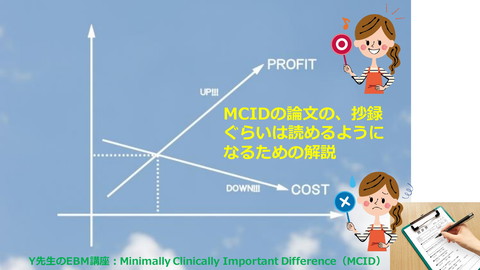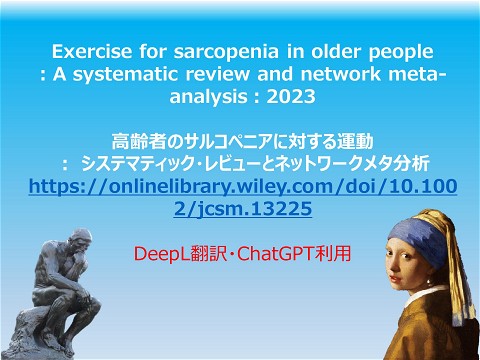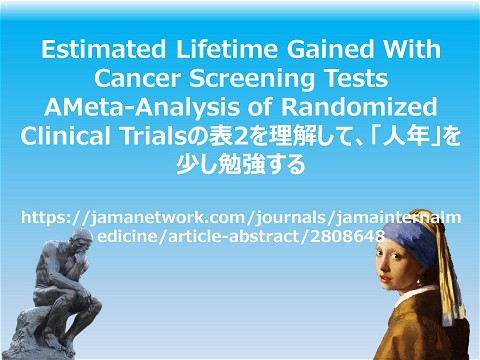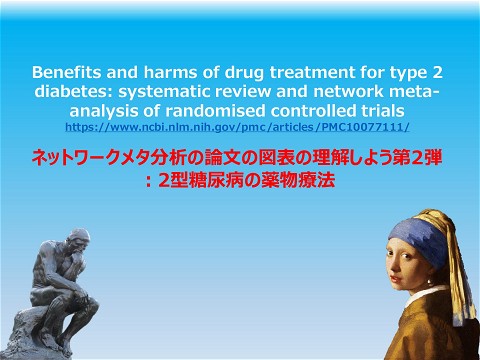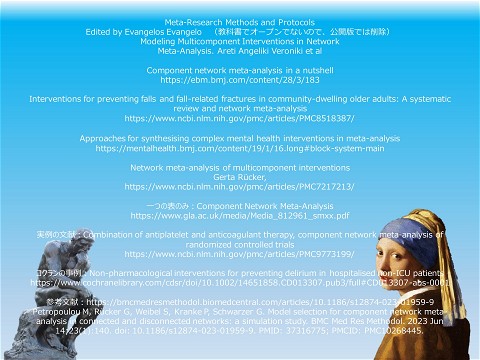歯科の予防論文で使われる Prevented Fractionとは?
1K Views
April 26, 23
スライド概要
関連スライド
各ページのテキスト
Y先生のEBM講座 歯科の予防論文で使われる Prevented Fractionとは?
2020年の歯科の予防の論文をみると Laura Timms. Fluoride varnish and dental caries in preschoolers: a systematic review and meta-analysis. Evid Based Dent. 2020 Mar;21(1):18-19. https://pubmed.ncbi.nlm.nih.gov/32221488/ 「At the individual level meta-analysis was by RR, at the tooth and surface level this was prevented fraction (PF) and weighted mean difference (WMD). Tooth level results gave a PF of 31.13% (95% CI 21.08, 41.18).」 個人レベルではRR、歯と表面レベルでは予防率(PF)と加重平均差 (WMD)によるメタ解析を行った。 歯レベルではPFは31.13%(95%CI 21.08, 41.18)であった。
ところが、このPFは、歯科の予防に詳しい先生でも、 馴染みがないらしい PubMedで簡単に、 「“Prevented fraction” (caries OR dental)」 と検索すると、68件(2020年12月)の論文があり、そのほとんどがシ ステマティックレビュー(メタ分析)の論文であった。 その中には、コクランレビューも多数含まれており、コクランで採用 されているアウトカム(結果の指標)であることより、知らなければ ならないアウトカムと言える。
コクランの予防歯科(小児歯科)で使われるアウトカム一 覧をみるとPFだけが、確かに馴染みがない・・・ Violaine Smaïl-Faugeron; Hélène Fron-Chabouis; Frédéric Courson. Methodological Quality and Implications for Practice of Systematic Cochrane Reviews in Pediatric Oral Health https://www.medscape.com/viewarticle/825527_1 • RR: relative risk • OR: odds ratio • SMD: standardized mean difference(標準化平均差、平均の差を標準偏差で除したもの) • PF: prevented fraction • D(M)FS increment: caries increment on permanent tooth surfaces • D(M)FT increment: caries increment in permanent teeth • dmfs increment: caries increment on deciduous tooth surfaces • dmft increment: caries increment in deciduous • MD: mean difference(平均差) • WMD:(荷重平均差) • RD: risk differences 上記論文になかったが追加 上記論文になかったが追加 上記論文になかったが追加 追加:以下の歯科のアウトカムをまとめた論文に、PFがなかった。 Outcomes in randomised controlled trials in prevention and management of carious lesions: a systematic review. https://trialsjournal.biomedcentral.com/articles/10.1186/s13063-017-2256-1
コクランハンドブックという世界的なシステマ ティックレビューの教科書にも、PFは歯科でよ く使われるとある Prevented fraction. This expresses the MD in change scores in relation to the comparator group mean change. Thus it describes how much change in the comparator group might have been prevented by the experimental intervention. It has commonly been used in dentistry (Dubey et al 1965). Deeple翻訳:これは、比較対象群の平均変化に対する変化スコアのMD を表す。したがって,比較対象群の変化が実験的介入によってどれだ け防止されたかを記述する.これは歯科学で一般的に使用されている (Dubey et al 1965)。 https://training.cochrane.org/handbook/current/chapter-06
PFがあるもっとも古い論文は? PubMedでは、「Llodra JC, Bravo M, Delgado-Rodriguez M, Baca P, Galvez R. Factors influencing the effectiveness of sealants--a metaanalysis. Community Dent Oral Epidemiol. 1993 Oct;21(5):2618. 」がもっとも古く検索される。 しかし、S D Dubey, R W Lehnhoff, A W Radike A statistical confidence interval for true per cent reduction in caries-incidence studies. J Dent Res. Sep-Oct 1965;44(5):921-3. によると、PFとい う用語を使わずに、the average per cent reduction figure of caries incidence(う蝕発生率の平均減少率)と表現し、この指標が使われている と述べている。 これがJDRの論文と言うことを考えると、1965年以前から、よく使われて いる指標と言うことになる。
近年、多用されるようになってきのはなぜか? このように、50年以上前から使われてきたのだが、とくに近年多く使 われるようになってきた。その理由は、コクランレビューとして、 フッ化物によるカリエスの予防を数多く発表しているMarinho先生が、 このPFが良いと述べていることが、大きな要因だろう。そのため、多 くのSRで必須の指標となっている。 2003より、「この測定値は平均差や標準化平均差よりも適切であると 考えられた。」と推奨している。 Marinho 2013:Valeria CC Marinho. Fluoride varnishes for preventing dental caries in children and adolescents. https://www.cochranelibrary.com/cdsr/doi/10.1002/14651858.CD002279.pub2/full Marinho 2015 : Fluoride gels for preventing dental caries in children and adolescents. https://www.ncbi.nlm.nih.gov/pmc /articles/PMC7138249/ Marinho 2016 : Fluoride mouthrinses for preventing dental caries in children and adolescent. https://www.ncbi.nlm.nih.gov/pmc /articles/PMC6457869/ Marinho 2003 : Systematic Review of Controlled Trials on the Effectiveness of Fluoride Gels for the Prevention of Dental Caries in Children . https://www.researchgate.net/publication/10756881_Systematic_Review_of_Controlled_Trials_on_the_Effe ctiveness_of_Fluoride_Gels_for_the_Prevention_of_Dental_Caries_in_Children
PFとは、何か? アウトカムか、と言われると、直接患者から測定するアウトカムでは ない。 たとえば、DMFS指数を介入前後で測定すると、そのDMFS指数を用い て計算した指標であるので、アウトカムと分類しない場合もある。 計算式は、 (対照群の平均増分ー介入群の平均増分) 対照群の平均増分 ×100 である。 う蝕の増分は、離散でなく連続量に近似しているので、連続量として 扱うことができるとされている。
PFを計算するためには、DMFSなどを論文から 抽出するが、研究間で書いてある事が異なる・・・ このため、 Marinhoらは、アウトカムの測定のルール を以下のように決めていた。 < 参考 > • DFS>DMFS>DS or FS • 「すべての表面タイプを合わせた」>「特定のタイプ」 • 「すべての萌出歯と萌出中を合わせた」> 「萌出歯」のみ>「萌出中」のみ • 「臨床検査と放射線検査を合わせた」>「臨床」のみ or 「放射線」のみ • 「歯髄/窩洞病変の」>「エナメル質/非窩洞病変」 • 「虫歯の純増分」>「粗い(観察された)増分」 • 「3年に最も近い追跡調査」>「他の期間」 • 欠損データは、う蝕増分がポアソン分布に従うことより推定した
実際の計算例を 介入群 治療前 治療後 対照群 カリエスな どの増加分 ((1.90-1.15) – (1.18-0.94)) (1.90-1.15) 治療前 ×100 = 治療後 カリエスな どの増加分 0.75-0.24 0.75 ×100 = 68% Azhani Ismail. The impact of anticipatory guidance on early childhood caries: a quasi-experimental study. BMC Oral Health (2018) 18:126 https://bmcoralhealth.biomedcentral.com/articles/10.1186/s12903-018-0589-0
実は、違う定義がある??? 医科、癌の人口動態などの疫学研究では、Prevented fraction for the population (PFP)と呼ばれる。 そして、これは、preventable fraction among the unexposed(PFu)とし て、(CER - EER) / CER、すなわち、相対リスク減少Relative risk reduction・RRRと同義語とされている。 どうも、 (A-B) / Aで計算したものが、予防率という感じのようだ。実は、歯 科でも、Petrieが、率の差をPFとして紹介している。なんとSIGNもこちらで ある。 コクランハンドブックでは、Thus it describes how much change in the comparator group might have been prevented by the experimental intervention. 実験的介入によって比較対照群の変化がどれだけ防げたかと 記載があることより、率で計算しても、確かに間違いではないとなる。 https://en.wikipedia.org/wiki/Preventable_fraction_among_the_unexposed https://www.thelancet.com/journals/anglo/article/PIIS2214-109X(20)30211-4/fulltext http://www.academia.dk/BiologiskAntropologi/Epidemiologi/PDF/Dictionary_of_Epidemiology__5th_Ed.pdf (疫 学事典) Petrie: https://www.nature.com/articles/4809877?platform=hootsuite SIGN:http://www.scottishdental.org/wp-content/uploads/2014/04/SIGN138.pdf
- https://en.wikipedia.org/wiki/Preventable_fraction_among_the_unexposed
- https://www.thelancet.com/journals/anglo/article/PIIS2214-109X(20)30211-4/fulltext
- http://www.academia.dk/BiologiskAntropologi/Epidemiologi/PDF/Dictionary_of_Epidemiology__5th_Ed.pdf
- http://www.scottishdental.org/wp-content/uploads/2014/04/SIGN138.pdf
よくよく考えると、現在ワクチンで話題の有効率も、 (CER - EER) / CER の計算ですね。 PFの訳語は?歯科のPF(差)では、訳さない方がよさそうです(有効率・ 予防分画と混同する)。そもそも、PFとも呼ばない方が良いかもね。 ワクチンの有効率 http://www.scj.go.jp/ja/info/kohyo/pdf/kohyo-19-t1032-8.pdf p30 http://medical.radionikkei.jp/kansenshotoday_pdf/kansenshotoday-191118.pdf| https://www.mhlw.go.jp/bunya/kenkou/kekkaku-kansenshou01/qa.html Q21 予防分画 http://www.kamiyacho.org/epi/modules/mod8/epi_20_C.pdf preventable fraction among the unexposed https://en.wikipedia.org/wiki/Preventable_fraction_among_the_unexposed 歯科のPF(差) https://www.ncbi.nlm.nih.gov/pmc /articles/PMC6457869/ 歯科のPF(率) Petrie: https://www.nature.com/articles/4809877?platform=hootsuite SIGN:http://www.scottishdental.org/wp-content/uploads/2014/04/SIGN138.pdf
95%信頼区間の計算は? これはアドバンス編で、必要ない方は飛ばして下さい Dubey先生が、もとだが、 Fiellerの方法というのもあるようである。 症例数 増加分の平均 増加分のSD 対照群 225 3.24 4.26 介入群 252 2.66 4.29 PF=(3.24-2.66)/2.24=18% 95%CI=0.18±A A=((1.96×S)/3.24)×(1/252+(2.66/3.24)×(2.66/3.24)×1/255)の2分の1乗 S=√((244×4.26×4.26+251×4.29×4.29)/(224+251)) D Dubey, R W Lehnhoff, A W Radike A statistical confidence interval for true per cent reduction in caries-incidence studies. https://journals.sagepub.com/doi/10.1177/00220345650440052801?url_ver=Z39.882003&rfr_id=ori:rid:crossref.org&rfr_dat=cr_pub%20%200pubmed PFは、介入が実施されていれば予防できたであろう対照群の疾患の割合に対応する(22)。PFの信頼区間(CI)はFiellerの方法を用いて計算された(23)。 22. Miettinen OS. Proportion of disease caused or pre-vented by a given exposure, trait or intervention.Am J Epidemiol 1974;99:325–32. 23. Abrams AM, McClendon BJ, Horowitz HS. Confidence intervals for percentage reductions. J Dent Res1972;51:492–7. https://www.researchgate.net/publication/319968982_A_systematic_review_of_the_effects_of_supervised_toothbrushing_on_caries_incidence _in_children_and_adolescents Gargiullo PM, Rothenberg R, Wilson HG (1995) Confidence intervals, hypothesis tests, and sample sizes for the prevented fraction in crosssectional studies. Stat Med 14:51–72. https://pubmed.ncbi.nlm.nih.gov/7701158/ 上記計算: Joseph. Statistical Management of Data in Clinical Research. https://journals.sagepub.com/doi/abs/10.1177/10454411900010010501
- https://journals.sagepub.com/doi/10.1177/00220345650440052801?url_ver=Z39.88-
- https://www.researchgate.net/publication/319968982_A_systematic_review_of_the_effects_of_supervised_toothbrushing_on_caries_incidence
- https://pubmed.ncbi.nlm.nih.gov/7701158/
- https://journals.sagepub.com/doi/abs/10.1177/10454411900010010501
Marinho先生、2009年のSRでは、PFのメタ分析の計算でき なかったようだ(現在は行なっている) Marinho先生は、2009年に、「With the use of prevented fraction, it was not possible to perform the main outcome analyses in RevMan/MetaView.」としていた。 その後、2013年から計算している。 「Review Manager 5.3 (RevMan 2014)を用いて、予防率と標準誤差データ[PF (SE)]を入力し、逆 分散加重平均としてPFのメタ解析を行った。我々は,Dubey 1965 で提示された式を用いて分散を推 定したが,これは加重平均での使用に適しており,大きな標本サイズでは近似が妥当であるはずで あった.2つの以前のレビュー(Marinho 2013;Marinho 2015)では、この式は小刻みな研究には 不適切であり、そのような研究からのデータは本レビューの分析から除外されるべきであると指摘し ている。我々は、全体を通してランダム効果メタアナリシスを使用し、全体を通して原歯と永久歯を 別々に分析した。」←これ、意味わからなくても良いですよ。 Marinho 2009: Fluoride toothpastes for preventing dental caries in children and adolescents (Review) https://www.uclachatpd.org/uploads/1/4/9/1/14918002/fluoride_toothpaste_for_preventing_dental_caries _1.pdf 「 We therefore decided to present D(M)FS and D(M)FT SMDs in RevMan, since it was not possible to present the main outcome analyses with PFs in MetaView/RevMan.」
PFの利点・意味 PFの利点: • 多くの研究で使われているので、比較がしやすい。 • 平均差や標準化平均差よりも適切であると考える。 • 絶対的な減少量(lc-le)と異なり、PFは研究集団の年齢層や研究期間などの実験環境の 影響を受けにくいと想定される。 PFの意味 • Thus it describes how much change in the comparator group might have been prevented by the experimental intervention. 実験的介入によって比較対 照群の変化がどれだけ防げたか(コクランハンドブック) • う蝕増分について提示された治療効果の指標(う蝕の増分(ΔDMFS)を予防率 (PF)に換算) • Marinho 2016らのSoFより: PF values between 1% and 10% are considered to be a small effect; between 10% and 20%, a moderate effect; above 20% a large or substantial effect. PF値が1%以上10%未満は効果が小さい、10%以上20%未満は中等度の効果、20% 以上は大または実質的な効果とされています。 そして、リスクでの層別化には、プラセボ群または無治療群のリスクの根拠は、レ ビューに含まれる研究の対照群の範囲と中央値で分けていた。
PFを用いると、歯みがき剤のフッ化物の濃度でPFが変化す るなど、いろいろな比較ができるので良い The caries-prevented fraction (PF) in relationship to fluoride concentration in toothpaste as compare with no fluoride. 歯磨き粉中のフッ化物濃度とフッ化物を含まない場合の齲蝕予防率(PF)との関係。 Marinhoら: 1%以上10%未満は効果が小さい 10%以上20%未満は中等度の効果 20%以上は大または実質的な効果 Twetman 2015:Svante Twetman. The evidence base for professional and self-care prevention - caries, erosion and sensitivity. https://bmcoralhealth.biomedcentral.com/articles/10.1186/1472-6831-15-S1-S4#Tab2 Data from Walsh et al. [8]. Walsh T, Worthington H V, Glenny A M, Appelbe P, Marinho V C, Shi X: Fluoride toothpastes of different concentrations for preventing dental caries in children and adolescents. Cochrane Database Syst Rev. 2010, 20 (1): CD007868-doi: 10.1002/14651858.CD007868.pub2
これであなたも、論文に、Prevented fractionがで てきても、すっと理解できるはずです。

